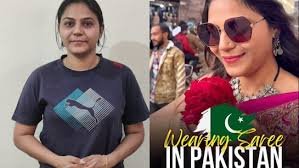
Indian YouTuber Jyoti Malhotra has come under the scanner of India’s top security agencies. She has been arrested and is being interrogated by the National Investigation Agency (NIA) and the Intelligence Bureau (IB). The main concern of these agencies is her travel history, especially her visits to Pakistan and China—two countries that share a tense relationship with India. These trips have now raised questions about her intentions and possible foreign connections.
Jyoti Malhotra is a well-known social media personality and content creator. She runs a YouTube channel where she talks about politics, global news, and India’s international relations. Her channel has a large number of followers and viewers. Her videos often go viral on social media platforms. However, her recent foreign trips have attracted the attention of the authorities, who now suspect that she might have been involved in activities that could pose a threat to India’s national security.
According to initial reports, the NIA and IB believe that Jyoti Malhotra’s visits to Pakistan and China were not just casual trips. Investigators are trying to find out whether these trips were planned as part of any foreign agenda. The agencies are particularly looking into the possibility that she might have been used by foreign groups to promote certain narratives or to collect sensitive information. Authorities are also checking if her trips were sponsored or funded by unknown entities.
The central issue is whether Jyoti was knowingly or unknowingly helping foreign agencies through her content or communication. Intelligence sources have stated that she traveled to Pakistan and China multiple times over the past two years. These trips were kept quiet and not shared openly on her YouTube channel or social media platforms. This secrecy has made investigators even more suspicious about her true purpose.
The NIA and IB are currently asking Jyoti many questions regarding her foreign travel. Some of the key questions include: Why did she visit Pakistan and China so frequently? Who sponsored these trips? Did she meet anyone suspicious while abroad? Was she carrying any electronic devices or important documents? Has she deleted any content from her phone or computer after returning? Did she receive any money from foreign sources? These questions are important for understanding whether her actions were innocent or connected to something more serious.
As part of the investigation, Jyoti Malhotra’s electronic devices, including her smartphone, laptop, and hard drives, have been seized. Experts in digital forensics are examining her devices to find out if there are any messages, emails, or documents that could support the suspicion of foreign links. Investigators are also checking if she used any encrypted messaging apps or hidden accounts to communicate with people outside India. Transactions, emails, and online activity are all under review.
Jyoti’s family and legal team have strongly defended her. Her lawyer has stated that she is innocent and is being unfairly targeted. They claim that she only went abroad for journalistic work and had no hidden agenda. According to her lawyer, Jyoti has always respected Indian laws and values and would never do anything that harms the country. Her legal team is preparing to file for bail, but the NIA has requested more time for interrogation.
This case comes at a time when India is taking national security matters very seriously. The country has been facing threats from cyberattacks, misinformation, and foreign propaganda. The government has already taken action against several influencers and YouTubers who were found promoting anti-India views. The authorities believe that Jyoti Malhotra’s case could become an example for how seriously India treats cases involving possible foreign influence through digital platforms.
This incident also brings attention to the growing connection between social media and national security. In today’s digital age, social media influencers have a lot of power. Foreign countries have often used online platforms to spread false information, confuse the public, and create divisions in other countries. If influencers like Jyoti Malhotra are unknowingly helping such efforts, it can become a big national security issue.
In the coming days, Jyoti will continue to be questioned by the NIA and IB. If the investigation finds strong evidence against her, she may be charged under laws like the Unlawful Activities (Prevention) Act (UAPA), the Official Secrets Act, and different sections of the Indian Penal Code. These are serious charges and could lead to long-term restrictions on her movement and activity. Her YouTube channel and social media accounts may also face strict monitoring or shutdown.
The Indian public is reacting in different ways to this situation. Some people believe that Jyoti is innocent and is being used as a scapegoat. Others argue that influencers must be held accountable for their connections and content, especially when national security is involved. Many people are now calling for stronger laws to monitor digital creators who discuss sensitive topics like politics, defense, and foreign relations.The arrest and ongoing investigation of YouTuber Jyoti Malhotra have raised major questions about the role of social media influencers in national security. Her visits to Pakistan and China are being examined carefully to understand if she was involved in any suspicious activities. Whether she is guilty or not will be determined by the results of the investigation. However, this case clearly shows that digital influence is not just about likes and views—it can have real consequences for a nation’s safety and peace.































